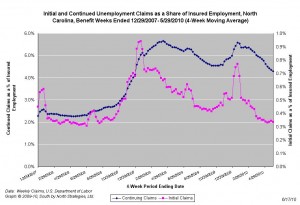Policy Points
18.06.2010
Policy Points
The May employment report for North Carolina paints a picture of a fragile labor market. Last month, the state added 12,900 more payroll positions than it lost. The gains were concentrated in the public sector due to significant hiring by the federal government, most likely for temporary census positions.
In May, employers added 12,900 more positions than they eliminated. The public sector netted 16,100 positions with federal hiring accounting for 80 percent of the total. Total private-sector payrolls, in contrast, fell by 3,200 positions. Among private industries, manufacturing shed the most positions (-2,900) followed by leisure and hospitality services (-2,700), Those losses were offset by gains in professional and business services (+1,600) and trade, transportation, and utilities (+1,300). And a revision to the April data raised net payroll growth for that month from 7,500 to 10,200.
Stabilizing labor market conditions are reflected in May’s household data. Last month, the labor force contracted by 0.1 percent as 6,027 individuals stopped working or seeking work. The number of employed individuals rose, and the number of unemployed individuals declined. The unemployment rate therefore dipped from 10.8 percent to 10.3 percent. Since the start of the recession, the number of unemployed Tar Heels has grown by 123.3 percent, and the unemployment rate has jumped from 4.7 percent to 10.3 percent.
Click here to read South by North Strategies’ full analysis.
18.06.2010
Policy Points
A Policy Brief from The Working Poor Families Project offers a framework for understanding how state policies and practices can create a demand for “clean energy” jobs and a supply of appropriately skilled workers.
In fact, several states are taking a leadership role in reducing barriers that low-income, low-skilled adults face in enhancing their education and skills and obtaining career-path jobs, family sustaining wages, and benefits within the clean energy sector. By and large, states are seeking to adapt existing workforce development policies and promising practices to clean energy, rather than inventing new strategies to address the sector’s needs.
—
… these states have sought to implement programmatic and policy actions that incorporate the clean energy sector into existing successful skills development and employment strategies, such as industry sector partnerships, bridge programs, and apprenticeship prep programs. in addition, states have connected clean energy skills development programs to existing education and workforce systems in an effort to build capacity and available resources. States also have leveraged innovative funding sources as another step to ensure sustainability of skills development programs. Finally … states also have taken measures to improve the quality of jobs and the commitment of employers to hire low-income adults and other disadvantaged individuals. it is time for other states to follow suit.
17.06.2010
Policy Points
Economic policy reports, blog postings, and media stories of interest:
17.06.2010
Policy Points
For the benefit week ending on May 29th, 11,765 North Carolinians filed initial claims for state unemployment insurance benefits, and 159,773 individuals applied for state-funded continuing benefits. Compared to the prior week, there were fewer initial and continuing claims; however, the filing week had one fewer day due to the Memorial Day holiday. These figures come from data released today by the U.S. Department of Labor.
Averaging new and continuing claims over a four-week period — a process that helps adjust for seasonal fluctuations and better illustrates trends — shows that an average of 12,856 initial claims were filed over the previous four weeks, along with an average of 164,120 continuing claims. Compared to the previous four-week period, both initial and continuing claims were lower.
 One year ago, the four-week average for initial claims stood at 23,355 and the four-week average of continuing claims equaled 216,029.
One year ago, the four-week average for initial claims stood at 23,355 and the four-week average of continuing claims equaled 216,029.
The graph (right) shows the changes in unemployment insurance claims (as a share of covered employment) in North Carolina since the recession’s start in December 2007.
Both new and continuing claims appear to have peaked for this business cycle, and the four-week average of new claims has fallen considerably. Yet continuing claims remain at an elevated level, which suggests that unemployed individuals are finding it difficult to find new positions.
17.06.2010
Policy Points
The U.S. Census Bureau currently is accepting public comments regarding a proposed “Supplemental Income and Poverty Measure” that would augment rather than replace the current poverty measure.
Comments are due by June 25, 2010, and detailed instructions are available here. Furthermore, a detailed memo describing the proposed measure is available from the Census Bureau.
A series of commentaries about the pros and cons of the proposed changes is available here.


 Email Sign-Up
Email Sign-Up RSS Feed
RSS Feed